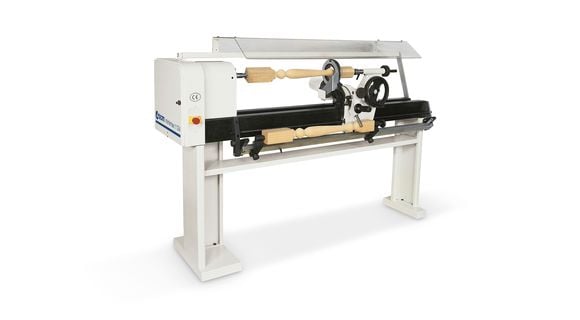Woodturning lathe
The SCM joinery machines are the products of continuing in-house development complementing the sum of the finest skills and know-how acquired when Minimax joined SCM. This brand, with its rich tradition, is known today as a model name.
A good woodturning lathe is determined by the following characteristics: power, speed, weight, stability and stiffness.
The power: a valid woodturning lathe must an adequate power for the size of the piece being machined. This is why the Minimax woodturning lathes have a power of 1.5 kW and 4 speeds that can be adjusted mechanically (570 / 1000 / 1850 / 2500 RPM) so that they can machine small and large pieces.
The stability, the weight and the stiffness are three elements that are strictly linked to each other and that determine the quality of the woodturning lathe, especially for demanding machining operations, such as overhanging operations. The main characteristic is the size (width and thickness) of the woodturning lathe body and the size and weight of the legs of the base; this is why the Minimax woodturning lathe stands out from the rest thanks to its sturdiness and stability that guarantee extremely precise machining.
Woodturning lathes without bed, that is those that have two round bars and the two or three supports must be screwed to your woodworking table don't offer the potentials listed above, because the stiffness is practically non-existent, as it is based on your possibility of screwing them solidly to a bench that weighs at least 80 kg and is adequately thick and sturdy.
The support for the woodworking lathe must be sturdy, wide and very thick because it is the support that gives the system stiffness and it must also absorb all the vibrations. The head of the lathe must be sturdy and with bearings that support the spindle. If the head can rotate, but it is secured in one point of the lathe, it can be used to pocket bowls and containers, and, if as well as rotating it can also translate and move to the centre of the bench, it can also be used to turn overhanging pieces with a regular and well balanced shape (within the limits of the motor power and total weight of the machine).
The track feeler is a very important tool, that allows a piece already turned to be replicated quickly and easily, by following its profile exactly and copying it precisely on the new piece being machined. This tool is indispensable when turning table legs, balcony parts, columns, etc.
Read more